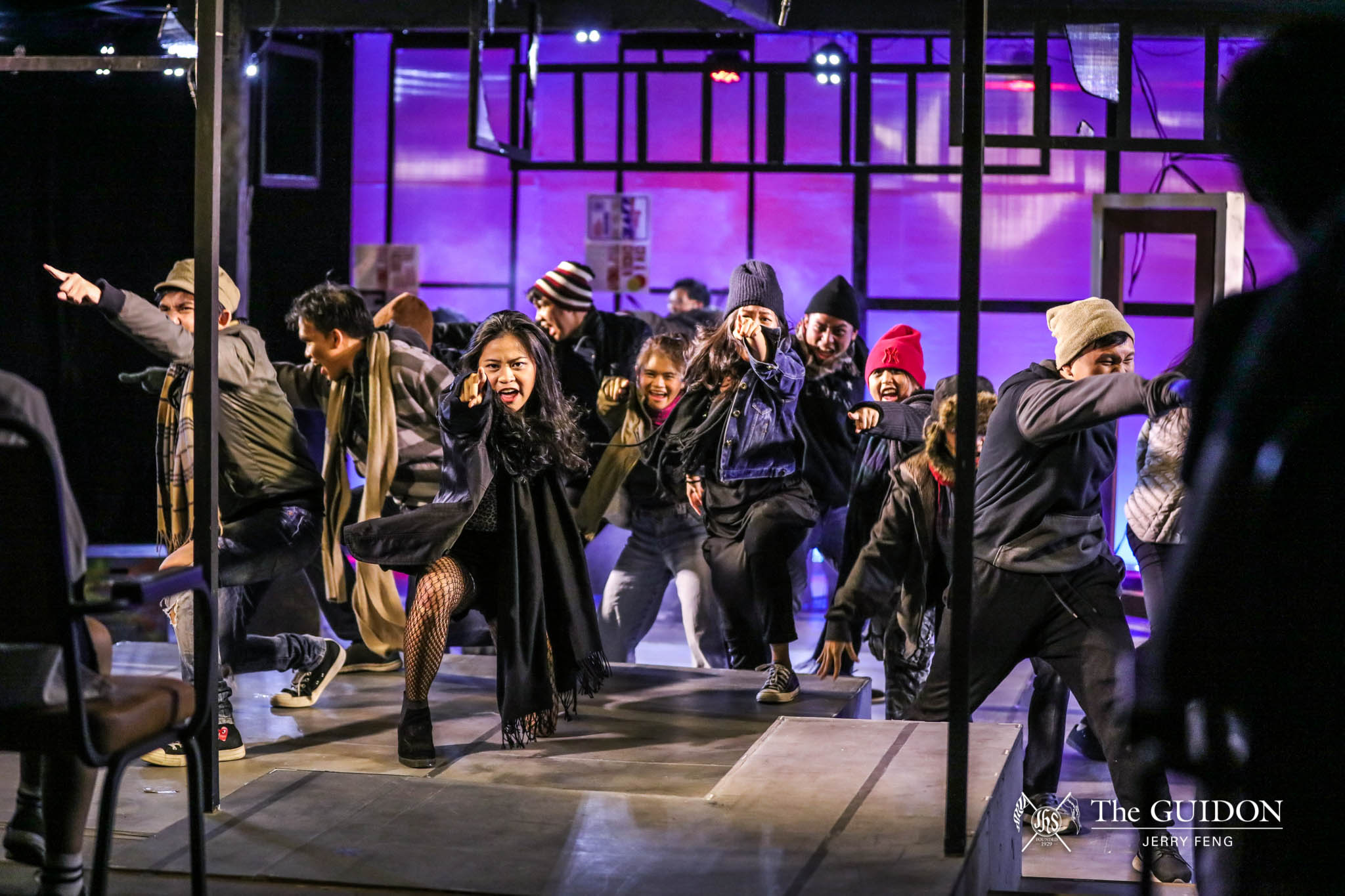More than 20 years ago, composer Jonathan Larson translated the opera La Bohème into a riotous musical about eight New Yorkers. The result was RENT, a show that would go on to score Tony and Drama Desk Awards for Best Musical (among other categories), plus a cult following along the way. This production is therefore a tall order for any theater company, but remains a story greater than the sum of its parts with Ateneo Blue Repertory’s (blueREP) staging—directed overall by Ricardo Magno, with musical direction by Abi Sulit and choreography by Franco Ramos.
Group dynamics
That is not to say the play’s individual arcs fall flat. RENT, after all, is character-driven, with a diverse group of friends at its forefront: aspiring filmmaker Mark (alternates Xander Blanco and Rando Torregosa), lonely rocker Roger (alternates Dave Agbayani and Ian Pangilinan), bold dancer Mimi (alternates Misha Fabian and Ashe Uy), idealistic professor Collins (alternates Ian Hermogenes and Gelo Esperanzate), vivacious drag queen Angel (alternates LJ Galvez and Adrian Lindayag), flirty artist Maureen (alternates Kass Barnes and Alexa Prats), and her girlfriend, cautious lawyer Joanne (Alecx Lorica and understudy Jaya Fugen). All seven are immersed in the broke, AIDS-stricken community of East Village, New York City. It doesn’t help that Mark and Roger have a then-friendly, now-dastardly landlord, Benny (alternates Rion Reyes and Jason Tan Liwag), waiting to evict them. These characters thus struggle to get by, subsisting on art, vices, and the throes of love.
Hence, RENT examines how these people slip in and out of each others’ lives over a year, amid such dreary conditions. The premium placed on relationships means that blueREP’s most striking song numbers are in groups, where the actors can play on each other’s emotions. Take, for instance, Mimi and Roger’s lust-charged meeting in “Light My Candle,” where she purrs after him as he tries to push her away. “Take Me or Leave Me” is a juicy, sonic sparring between the carefree Maureen and careful Joanne, as their differences clash with their love. They meet in fiery harmonies and drawn-out notes, in a contrast to the sweetly sung promises of “I’ll Cover You” by Collins and Angel. These three duets are just some examples of how chemistry largely sells the show.
To the same nuanced effect, Ramos’ choreography pushes and pulls, from huge movements to smaller ones when appropriate—whether they allow Mimi and Roger or Joanne and Maureen to circle each other tentatively, Joanne and Mark to have awkward-turned-deliberate steps in “Tango: Maureen,” or Angel to bust out her sassy drumming act (in heels!) to astonished friends in “Today 4 U.” In performances like “La Vie Boheme,” the cast deftly maneuvers around tables and chairs to pull off a vibrant café scene. It’s these descriptive, measured steps that add context to every song, which is important when solo vocals and dialogue are often overpowered by booming accompaniments. So of course, the more the merrier: more voices singing, more bodies moving in demonstrative sequences, and in turn, a better grasp of the plotline drowned out by its too-loud backing tracks.
Seasons of change
In that regard, RENT definitely grows stronger in numbers and shines brighter when considered as a bigger picture. Main players aside, this production is grounded in its highly versatile ensemble who assume different positions yet nail thoughtful performances throughout. It’s important to see these not as throwaway roles, but as the very drivers of the play’s most socially relevant aspects: they serve as homeless people (“Christmas Bells”), AIDS support group members (“Will I”), and parents estranged from their children (“Voice Mail #5”). Even as revelers in “La Vie Boheme,” these actors take care to maintain the feel of a café from the background: the passing of a bottle and scrunched-up faces upon taking a swig, muted conversations while one of the starring seven owns the spotlight, among other feats. On a more comical note, Maureen’s “Over the Moon” spoken word piece is lacking without her ensemble backups—also dressed as fantasy cows, complete with impassioned thrashing and mooing to her words.
blueREP still exhibits creativity beyond its cast. RENT is typically performed on a more elaborate, multi-storey reproduction of East Village, with decrepit staircases and balconies. For this version, the Rizal Mini Theater (RMT) simply features a stage in front and an elevated runway cutting through viewers’ seats: perfect for audience engagement, since cast members are able to get as close to them as possible. Large black frames are made to look like broken window panes, forming the backdrop and hanging from beams. This basic design already evokes the original dinginess, which the movable inputs build on.
At any given time, there is either a ratty couch for a cheap apartment, its doorway later becoming café and church entrances; band posters for Roger to peruse and crumple; crates as chairs, side tables, or pedestals for fervent solos. These pieces are just enough to present New York squalor without crowding the stage—so the sparse set-up lets actors spread out for sweeping dance numbers or multi-location scenes. What the crew does to change the seasons indoors is also pretty magical for a student production.
RENT doesn’t seem to be about magic on the surface. There’s humor and fun, but gritty social commentary underlying it. This is a play that has straight and LGBT characters working through romance, friends facing the weight of AIDS with optimism, and artists chasing their craft but making time for their loved ones. You can’t help but root for these underdogs who come together in communal hope despite their hardships.
By channeling that spirit of adaptability and solidarity, blueREP transcends many performative limitations for a run quite difficult to forget or regret.






